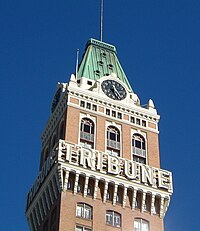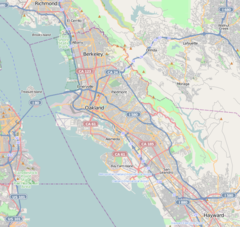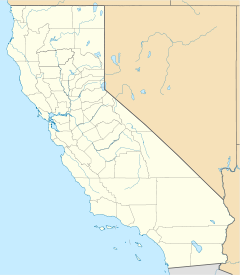Tribune Tower (Oakland)
| Tribune Tower | |
|---|---|
 |
|
|
Location within Oakland, California
|
|
| General information | |
| Status | Complete |
| Type | Office |
| Location | 409 13th Street Oakland, California |
| Coordinates | 37°48′11″N 122°16′14″W / 37.8031°N 122.2705°WCoordinates: 37°48′11″N 122°16′14″W / 37.8031°N 122.2705°W |
| Opening | 1906 |
| Owner | CallSocket |
| Height | |
| Roof | 305 ft (93 m) |
| Technical details | |
| Floor count | 22 |
| Design and construction | |
| Architect | D. Franklin Oliver, Edward T. Foulkes |
The Tribune Tower is a 305-ft. (93 m), 22-story building located in downtown Oakland, California. Built in 1906, tower erected in 1923, the 89,251 sq.-ft. (8,291 sq.-m.) building was the tallest building in Oakland constructed in the 1920s. It is currently the 11th tallest building in Oakland.
The architecture of the tower, much like The Campanile on the UC Berkeley campus (officially the Sather Tower), was inspired by St Mark's Campanile in Venice, Italy.
The building was opened by Joseph R. Knowland on January 1, 1924, as the home of the Oakland Tribune newspaper, and is a symbol of both the Tribune and the city of Oakland.
In 1915, when Joseph Knowland, a former U.S. congressman, acquired the Oakland Tribune, the newspaper was located at Eighth and Franklin streets in the old Golden West Hotel. In 1918, the Breuner Furniture Company vacated its home at Thirteenth and Franklin. Knowland envisioned the vacated showroom and an adjacent warehouse as the site of a first-class newspaper facility. He began to implement this vision with the acquisition of the Breuner's property and the move of the Tribune there.
What became the six-story base of the Tribune Tower had been designed by D. Franklin Oliver and completed in 1906. (The warehouse, which became the Tribune's press room, had been built in the 1890s on the site of the old Pantages Theatre.) The now-familiar clock tower, designed by Edward T. Foulkes, was added in 1923 to complete the Tribune Tower as it appears today. The architect designed the tower with a mix of French and Italian classical elements, topped with a copper green mansard roof with punched eye windows.
From 1924, the Tower would appear on the newspaper's masthead. The top floor of the tower housed radio station KLX from its opening until the station was sold in 1959. KLX was sold to pay off debts incurred in the ill-fated 1958 run by U.S. Senator William F. Knowland, Joseph Knowland's son, for governor of California. Joseph Knowland was a political mentor to his son, as well as to California attorney general and governor Earl Warren and many other Republicans.
The Tribune Tower gained national attention in 1923 when magician Harry Houdini demonstrated his skills by escaping from a straitjacket while dangling upside down from the ninth floor of the building. (It took him five seconds to escape.)
...
Wikipedia



